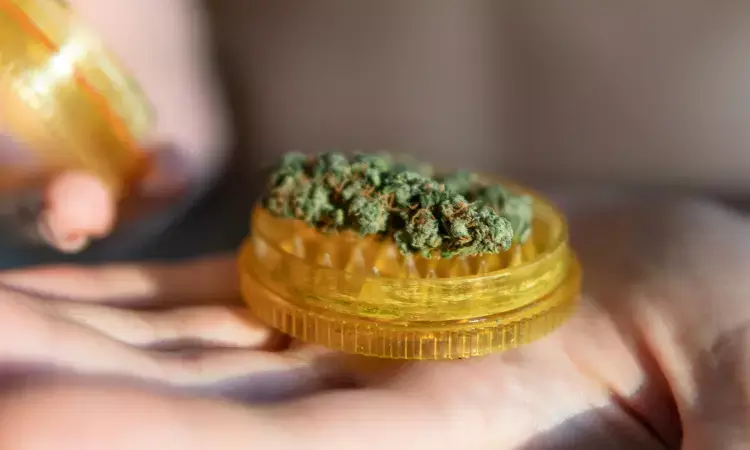- Home
- Medical news & Guidelines
- Anesthesiology
- Cardiology and CTVS
- Critical Care
- Dentistry
- Dermatology
- Diabetes and Endocrinology
- ENT
- Gastroenterology
- Medicine
- Nephrology
- Neurology
- Obstretics-Gynaecology
- Oncology
- Ophthalmology
- Orthopaedics
- Pediatrics-Neonatology
- Psychiatry
- Pulmonology
- Radiology
- Surgery
- Urology
- Laboratory Medicine
- Diet
- Nursing
- Paramedical
- Physiotherapy
- Health news
- Fact Check
- Bone Health Fact Check
- Brain Health Fact Check
- Cancer Related Fact Check
- Child Care Fact Check
- Dental and oral health fact check
- Diabetes and metabolic health fact check
- Diet and Nutrition Fact Check
- Eye and ENT Care Fact Check
- Fitness fact check
- Gut health fact check
- Heart health fact check
- Kidney health fact check
- Medical education fact check
- Men's health fact check
- Respiratory fact check
- Skin and hair care fact check
- Vaccine and Immunization fact check
- Women's health fact check
- AYUSH
- State News
- Andaman and Nicobar Islands
- Andhra Pradesh
- Arunachal Pradesh
- Assam
- Bihar
- Chandigarh
- Chattisgarh
- Dadra and Nagar Haveli
- Daman and Diu
- Delhi
- Goa
- Gujarat
- Haryana
- Himachal Pradesh
- Jammu & Kashmir
- Jharkhand
- Karnataka
- Kerala
- Ladakh
- Lakshadweep
- Madhya Pradesh
- Maharashtra
- Manipur
- Meghalaya
- Mizoram
- Nagaland
- Odisha
- Puducherry
- Punjab
- Rajasthan
- Sikkim
- Tamil Nadu
- Telangana
- Tripura
- Uttar Pradesh
- Uttrakhand
- West Bengal
- Medical Education
- Industry
Cannabis users require more sedation for endoscopy compared to non users

Patients who use cannabis required higher levels of sedation during gastric endoscopies than non-users, according to research to be presented at Digestive Disease Week® (DDW) 2022. As cannabis is legalized in more places and usage rises, clinicians should be aware of patients' habits and prepare themselves and their patients for increased sedation and accompanying risks, researchers said.
"Patients didn't have increased awareness or discomfort during procedures, but they did require more drugs," said Yasmin Nasser, MD, PhD, lead researcher on the study and assistant professor at Snyder Institute for Chronic Diseases Cumming School of Medicine University of Calgary.
Researchers conducted a prospective cohort study of 419 adult outpatients undergoing endoscopic procedures at three Canadian centers. Procedures were conducted under conscious sedation, which leaves the patient relaxed and comfortable but partially conscious during the procedure.
Each patient completed two questionnaires, one before the procedure about their cannabis use and another afterwards indicating their awareness and comfort level during the procedure. The questionnaires were analyzed along with details about the use of the sedatives midazolam, fentanyl and diphenhydramine during the procedure.
Cannabis use was associated with increased odds of requiring higher total sedation-defined as more than 5 mg of midazolam, or more than 100 mcg of fentanyl, or the need for diphenhydramine-during gastroscopy, an endoscopic procedure that begins with insertion of a tube and camera through the throat. Cannabis use was not associated with higher use of sedation during colonoscopy.
Gastroscopy generally requires more sedation than colonoscopy because the inserted scope causes irritation in the upper part of the gastrointestinal tract, often triggering the gag reflex. Cannabinoid use was not independently associated with fentanyl use or adverse events, nor was it associated with intra-procedural awareness or discomfort.
This study looked at whether patients were users or non-users of cannabis, but did not examine the timing, quantity or route of cannabis intake prior to procedure, whether it was inhaled, vaporized, ingested or otherwise.
Researchers say these variables could be the basis for future study. Also, researchers only examined the impacts of baseline cannabis use during procedures that use conscious sedation and did not examine its impact on propofol sedation, which is more commonly used in the U.S.
Dr Kamal Kant Kohli-MBBS, DTCD- a chest specialist with more than 30 years of practice and a flair for writing clinical articles, Dr Kamal Kant Kohli joined Medical Dialogues as a Chief Editor of Medical News. Besides writing articles, as an editor, he proofreads and verifies all the medical content published on Medical Dialogues including those coming from journals, studies,medical conferences,guidelines etc. Email: drkohli@medicaldialogues.in. Contact no. 011-43720751


